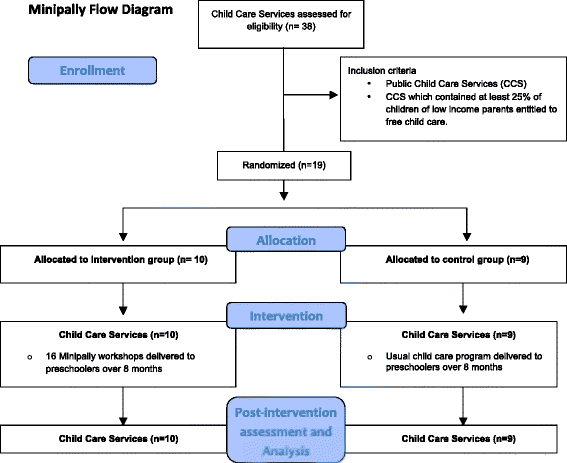Testing the impact of a social skill training versus waiting list control group for the reduction of disruptive behaviors and stress among preschool children in child care: the study protocol for a cluster randomized trial
- PMID: 28784179
- PMCID: PMC5545840
- DOI: 10.1186/s40359-017-0197-9
Testing the impact of a social skill training versus waiting list control group for the reduction of disruptive behaviors and stress among preschool children in child care: the study protocol for a cluster randomized trial
Abstract
Background: Most preschoolers growing up in western industrialized countries receive child care services (CCS) during the day, while their parents are at work. Meta-analytic data suggest that CCS represent a stressful experience for preschoolers. This may be because preschoolers have not yet developed the social skills necessary to cope with the new and rapidly fluctuating social contexts of CCS. We tested the effectiveness of a child care-based social skill training program aiming to improve children's social behaviors and reduce the stress they experience.
Method and design: We used a cluster randomized control trial (cRCT) to compare children's social behaviors and stress levels in pre- and post-intervention according to whether they received a social skill training intervention or not. Nineteen (n = 19) public CCS (n = 362, 3-years-old preschoolers) of underprivileged neighborhoods (Montreal, Canada) were randomized to one of two conditions: 1) social skills training (n = 10 CCS); or 2) waiting list control group (n = 9 CCS). Educators in the intervention group conducted bi-weekly social skills training sessions over a period of 8 months. The intervention covered four topics: making social contacts, problem solving, emotional self-regulation, as well as emotional expression and recognition. Main outcome measures included preschoolers' disruptive (e.g. aggression, opposition, conflicts) and prosocial behaviors (e.g. sharing toys, helping another child), and stress levels assessed by salivary cortisol sampling at pre and post intervention assessments. Educators' practices will be tested as potential mediators of the expected changes in behaviors and neuroendocrine stress.
Discussion: To our knowledge, this is the first cRCT to test the effectiveness of a child care based social skill training program on the reduction of disruptive behaviors and levels of stress. Significant challenges include the degree of adherence to the intervention protocol as well educators and preschoolers' turnover.
Trial registration: Current clinical trial number is ISRCTN84339956 (Ongoing study, Retrospectively registered on March 2017) No amendment to initial protocol.
Keywords: Child care services; Cortisol; Intervention; Poverty; Social development; Social skill training.
Conflict of interest statement
Ethics approval and consent to participate
Consents to participate in the study were obtained from parents, educators and head of the CCS. The Sainte-Justine Hospital Ethical Research Committee approved all procedures in May 2013 ref.: 2014–565, 3738. A renewal of the ethic approval is delivered every year since then.
Consent for publication
Consent to publish the results in was obtained from parents, educators and head of the CCS.
Competing interests
The authors declare that they have no competing interest
Publisher’s Note
Springer Nature remains neutral with regard to jurisdictional claims in published maps and institutional affiliations.
References
Publication types
MeSH terms
LinkOut - more resources
Full Text Sources
Other Literature Sources


